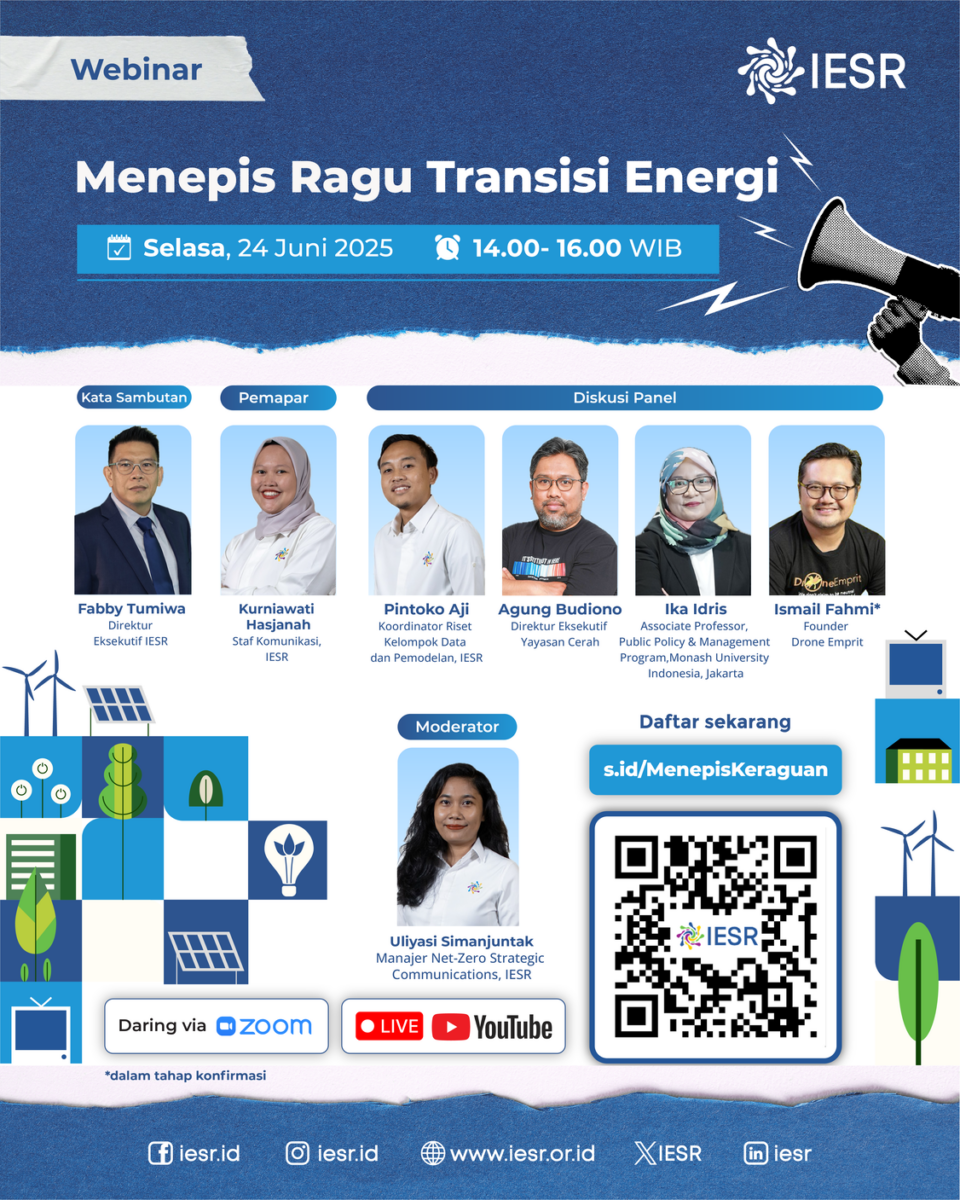
Webinar on Dispelling Doubts about the Energy Transition
Background
The energy transition to clean energy sources is a crucial part of Indonesia’s efforts to meet global commitments in tackling climate change. Indonesia has ratified the 2015 Paris Agreement, which targets the world to achieve carbon neutrality by the middle of this century (around 2050). As a form of contribution, Indonesia has set a net-zero emission (NZE) target by 2060 or sooner. The Indonesian government has issued several recent policies to accelerate the energy transition. In April 2025, the Minister of Energy and Mineral Resources Regulation No. 10 of 2025 was issued, containing a roadmap for the energy transition in the electricity sector. This regulation regulates the plan for the gradual termination of coal-fired power plant operations in order to achieve NZE 2060, including through accelerating early retirement of power plants based on certain criteria and prohibiting the construction of new power plants. In addition, the government has prepared the National Electricity General Plan (RUKN) 2025–2060, with 79% of the supply coming from renewable energy.
However, the dynamics of public discourse also need to be considered. The Institute for Essential Services Reform (IESR) observed that discourse on energy transition in the mass media tends to focus on macro issues, while the wider audience is often limited in finding practical information that is relevant to everyday life.
Based on the Cerah Report, in 2024, there will be around 25 thousand conversations in the media for climate and environmental transition issues, while on social media it will reach 65 thousand conversations. The majority of discussions in the public sphere on these issues are still above the surface. The questions are about the types of renewable energy, energy transition targets, and projections of the climate crisis in 2050. Public sentiment towards environmental and renewable energy issues tends to be neutral, indicating a lack of active discussion at the community level.
In addition, there is also circulating incorrect information and misperceptions regarding the energy transition. For example, there is the assumption that “early termination of PLTU is economic suicide“, or assuming that technological solutions such as carbon capture storage and biomass co-firing are sufficient to overcome the problem.
Without proper understanding, public doubt and skepticism can hinder the implementation of energy transition policies. This doubt is also fostered by the circulation of fake news. One that is often discussed is related to the stability of energy supply from renewable energy-based energy systems.
The Institute for Essential Services Reform (IESR) consistently produces scientific analysis for various energy transition issues in Indonesia, as well as creating various knowledge packages to reach a wider public. These knowledge packages come in various forms ranging from articles on the website, social media slides, audio podcasts, and audio visuals (short videos and long videos).
To provide practical and easily understood knowledge guidelines for the general public, IESR has compiled information on the website for “Dispelling Doubts about the Energy Transition” which contains descriptions of various questions and misconceptions about Indonesia’s energy transition and what the facts or correct information are regarding the issue.
Objective
- Disseminating the “Menepis Ragu Transition Energi” website page and getting feedback
- Discussing strategies to combat unanswered questions and misconceptions surrounding the energy transition
Speakers
-
Fabby Tumiwa - Chief Executive Officer (CEO) - IESR
-
Ika Idris - Associate Professor - Public Policy and Management - Monash Climate Change Communication Research Hub
-
Ismail Fahmi - Founder Drone Emprit
-
Agung Budiono - Executive Director of Yayasan Cerah
-
Pintoko Aji - Data and Modeling Group Research Coordinator - IESR

